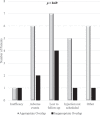Assessment of oral overlap with antipsychotic long-acting injectables initiated in an inpatient setting
- PMID: 37448828
- PMCID: PMC10337880
- DOI: 10.9740/mhc.2023.06.147
Assessment of oral overlap with antipsychotic long-acting injectables initiated in an inpatient setting
Abstract
Introduction: Long-acting injectable (LAI) antipsychotics are a promising solution to combating issues related to nonadherence to oral antipsychotics. Oral overlap is utilized when an LAI is initiated to achieve therapeutic concentrations. The place in therapy in which additional overlap is warranted is often mistaken, and providers may prescribe additional overlap based on the presentation of the patient or misunderstanding of appropriate overlap.
Methods: This retrospective chart review assesses patients who were initiated on an LAI while admitted to the acute inpatient psychiatric unit from January 1, 2016, to December 31, 2019. The primary outcome assesses the appropriateness of oral overlap with LAIs. Secondary outcomes include adherence to oral overlap, discontinuation of an LAI within 4 months, and reason for discontinuation of LAI.
Results: A total of 62 patients were included: 40 (65%) had appropriate overlap, and 22 (35%) had inappropriate overlap. The most common LAI was paliperidone (n = 50, 81%). Patients were adherent to oral overlap in 67% (n = 6) of the appropriate overlap group and 85% (n = 17) of the inappropriate overlap group. Discontinuation of an LAI in 4 months occurred in 62.5% (n = 25) of the appropriate group and 40.9% (n = 9) of the inappropriate group. There were no significant differences in secondary outcomes when comparing adherence to oral overlap (p = .26), discontinuation of LAI within 4 months (p = .62), and reason for discontinuation (p = .69).
Discussion: This study identified that a majority of patients had appropriate prescribing of oral antipsychotic overlap.
Keywords: long-acting injectable; oral overlap; transitions of care; veterans.
© 2023 AAPP. The Mental Health Clinician is a publication of the American Association of Psychiatric Pharmacists.
Conflict of interest statement
Disclosures: The authors of this study have no real or potential conflicts of interest to disclose. All authors had full access to the data and a role in writing the manuscript.
References
-
- National Institute of Mental Health [Internet] Mental health medications. [revised 2016 Oct; 2021 Sep 27]. Available from: https://www.nimh.nih.gov/health/topics/mental-health-medications.
-
- Devrımcı Özgüven H, Kir Y. Long acting injectable antipsychotics in the treatment of schizophrenia and bipolar disorder. Noro Psikiyatr Ars. 2021;58(Suppl 1):S47–52. https://doi.org/10.29399/npa.27480 PubMed PMID: 34658635. - DOI - PMC - PubMed
-
- Keepers GA, Fochtmann LJ, Anzia JM, Benjamin S, Lyness JM, Mojtabai R, et al. The American Psychiatric Association practice guideline for the treatment of patients with schizophrenia. Focus (Am Psychiatr Publ) 2020;18(4):493–7. https://doi.org/10.1176/appi.focus.18402 PubMed PMID: 33343262. - DOI - PMC - PubMed
-
- Stevens GL, Dawson G, Zummo J. Clinical benefits and impact of early use of long-acting injectable antipsychotics for schizophrenia. Early Interv Psychiatry. 2016;10(5):365–77. https://doi.org/10.1111/eip.12278 PubMed PMID: 26403538. - DOI - PMC - PubMed
LinkOut - more resources
Full Text Sources

